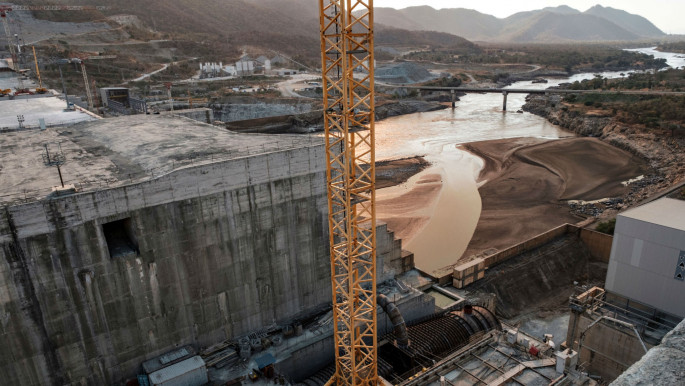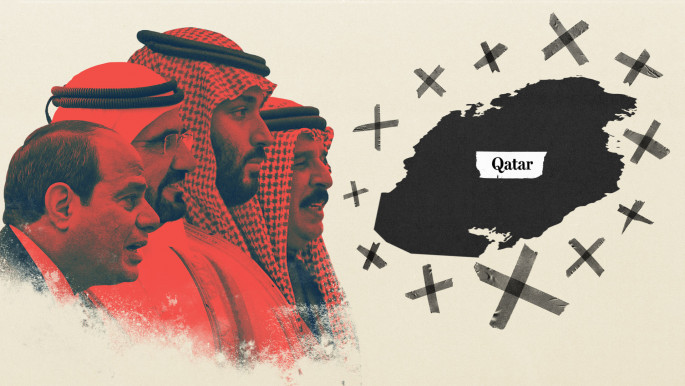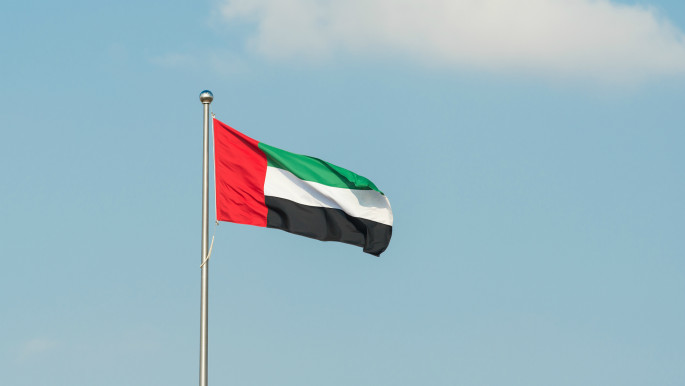Divide and survive: Ethiopia's relations with the Gulf and Turkey
Ethiopia is playing big with the Gulf. Over the past two years, the landlocked African country has bolstered relations with Saudi Arabia and the United Arab Emirates (UAE), as well as Qatar and Turkey.
In line with Ethiopia's longstanding policy of neutrality vis-à-vis non-African disputes, Addis Ababa has avoided taking sides in the blockade of Qatar and the Iranian-Saudi confrontation. But at a time of intra-Gulf and broader Middle Eastern rivalries, how could external competitions impact Ethiopia?
By and large, Ethiopia is the most coveted target of the ongoing scramble for the Horn of Africa. Not just its geographic centrality, but also the country's economic and demographic prospects make it an indispensable partner for external actors trying to carve out a sphere of influence in the region.
In parallel, Ethiopian Prime Minister Abiy Ahmed Ali reached out to the countries across the Red Sea seeking much-needed financial assistance to foster the country's economic transition.
So far, the Ethiopian president has skilfully played the divisions between his partners to harness aid and investment while staying neutral.
 |
Over the past two years, Ethiopia has bolstered relations with Saudi Arabia and the UAE, as well as Qatar and Turkey |  |
But the more Gulf states engage with the Horn of Africa, the more neutrality becomes untenable. This trend then dramatically coincides with rising tensions within Ethiopia's political arena. Such a mix of internal and external pressures could prove dangerous for Ethiopia.
One sea, many bridges
Saudi Arabia and the UAE have always followed similar, when not coordinated, engagement strategies with Ethiopia. Both Gulf powerhouses invested in agricultural projects for decades to boost food security at home. Since 2000, the Saudis and Emiratis expanded their investments in the manufacturing, tourism and energy sectors, but not in a meaningful way until 2018.
 |
|
| Read more: Ethiopia's Great Renaissance Dam: A catastrophe for Egypt? |
That year Prime Minister Abiy Ahmed emerged as president in the Ethiopian single-party system. Riyadh and Abu Dhabi hence seized the opportunity to consolidate their recent takeover of the Eritrean base of Assab by facilitating a peace agreement between Ethiopia and Eritrea, signed in Jeddah.
Concerned with Iran and Qatar's presence in the country, Riyadh and Abu Dhabi invested heavily in Ethiopia since that peace agreement's signing. Most notably, the UAE committed $3 billion in investment and assistance ($1 billion of which was deposited in the National Bank of Ethiopia).
Other UAE-funded infrastructural projects are expected to benefit Addis Ababa, such as the development of the ports of Berbera (Somaliland) and Assab, as well as an oil pipeline from the Red Sea to Ethiopia. Finally, the Ethiopian diaspora in the Gulf is another crucial element in bilateral relations.
Ethiopian migrants in Gulf Cooperation Council (GCC) member-states have not only boosted development through remittances. They have also facilitated trade and investment between Gulf states and their motherland.
Addis Ababa kept parallel relations with Qatar. After the Gulf crisis erupted in June 2017, Doha began reaching out more robustly in 2017 when the blockade forced the Qataris to rely on third countries for food imports. As a result, Qatari business people started to invest in the Ethiopian agro-food sector, while others recently expressed interest in the hospitality and health sectors. A clear signal of positive bilateral relations was sent in March 2019, when Prime Minister Abiy Ahmed visited Qatar.
 |
So far, the Ethiopian president has skilfully played the divisions between his partners to harness aid and investment while staying neutral |  |
Last but not least, Turkey enjoys a strong and lasting partnership with Ethiopia. Besides the support to schools and mosques, Addis Ababa is the first African destination of Turkish foreign direct investments with $2.5 billion out of $6 billion. Furthermore, back in February, Prime Minister Abiy Ahmed agreed to cooperate with the Somali federal government, Ankara's main ally in the Horn of Africa, reversing a long legacy of rivalry between Addis Ababa and Mogadishu.
Ethiopia's fault lines
Ethiopia's many fault lines, which external actors can leverage, complicate the country's calculus. The first issue comes from the ongoing transition to democracy. In November 2019, Prime Minister Abiy Ahmed decided to dismantle the Ethiopian People's Revolutionary Democratic Front (EPRDF), the 30-year-old ruling party based on a coalition among the main ethnic groups.
In its place, he championed the formation of the non-ethnic Ethiopian Prosperity Party (EPP). Yet recent inter-ethnic clashes, such as those in the Ahmara and southern states last year, already mobilised many Ethiopians along ethnic lines, resulting in the displacement of 1.6 million people, according to official data. Consequently, the EPP will face fierce competition from regional ethnic parties at the upcoming national elections.
 |
|
| Read more: Three years on, the internationalisation of the Gulf crisis has made it harder to resolve |
The most concerning case of regional nationalism is probably in Oromia, Ethiopia's largest region. Oromia, where there is a history of grievances related to political and economic marginalisation, has long struggled for autonomy and hosts two ethno-nationalist parties ready to challenge the EPP. Oromos are not only ethnically-mobilised but they also represent Ethiopia's Muslim minority (who represent 35 percent of the national population), which brings us back to the GCC members.
In contrast to its Sufi Islamic tradition, Oromia has a growing Salafi influence as a result of Saudi preachers who began coming to Ethiopia in the 1960s. The result is that Salafism became the dominant Islamic trend among Oromos, creating difficulties for Christian-Muslim coexistence.
The third issue, also entwined to the previous ones, is the years long Nile dam dispute. The construction of the Grand Ethiopian Renaissance Dam (GERD) has put Addis Ababa and Cairo at loggerheads. Ethiopia wants to ascend as a power exporter, which could help alleviate poverty in the country, yet Egypt fears that the dam will significantly reduce the Nile water level.
 |
The more Gulf states engage with the Horn of Africa, the more Ethiopia's neutrality becomes untenable |  |
Negotiations have repeatedly down broken amid reciprocal accusations and both parties stand ready to defend their rights in every possible way. On 22 June, Egypt's Foreign Minister Sameh Shoukry warned that Cairo would be "in a situation that we will have to deal with," if UN efforts to bring Addis Ababa back to roundtable negotiations prove futile. "When that time is upon us, we will be very vocal and clear in what action we will take."
Perhaps a full-fledged war seems out of the question, although some experts, such as the International Institute for Security's David Wolde Giorgis, maintain that it is a serious possibility. Nonetheless, as the Egyptians have threatened to wage military action against Ethiopia over the GERD dispute, unconventional attacks are certainly possible.
This might already be the case after the governor of Oromia accused Egypt of fuelling the recent spate of riots in his state. On top of that, the Nile dispute puts Saudi Arabia in an uncomfortable position of having to balance its traditional alliance with Egypt and the Kingdom's rapprochement with Ethiopia.
 |
|
| Read more: The UAE's unprecedented activity in Africa |
Finally, the global Covid-19 pandemic is accelerating some of these dynamics. The outbreak pushed Prime Minister Abiy Ahmed to postpone elections, which led to opposition groups harshly criticising him. Then to contain the spread of Covid-19 Saudi Arabia quickly repatriated thousands of Ethiopian migrants, forcing Addis Ababa to set up emergency facilities for quarantine and testing.
Third, the oil crisis will likely affect aid flows across the Red Sea, at least in the short term. This could incentivise donors to apply more stringent conditions and recipients to accept them, given the severe impact of the coronavirus in East Africa.
Addis Ababa's multiple relations with GCC states represent a mix of opportunities and risks. So far, Ethiopia has been a beneficiary of this competition for cooperation in the Horn of Africa. Saudi Arabia, the UAE, Qatar, and Turkey all committed significant resources in support of Ethiopia, although Addis Ababa stayed neutral on the main political issues concerning its partners. Yet this equilibrium could change.
Ethiopia, where more than 25 percent of the population lives on less than two dollars a day, needs financial assistance. At the same time, this country, which has a population of 110 million, is profoundly fractured, opening up opportunities for external actors to exploit such divisions in order to extract concessions from Addis Ababa. Then, coronavirus seems to complicate outstanding issues while potentially affecting aid flows. Ultimately, the scramble for Ethiopia risks spiralling out of control.
Giorgio Cafiero is the CEO of Gulf State Analytics, a Washington, DC-based geopolitical risk consultancy.
Follow him on Twitter: @GiorgioCafiero
Corrado Čok is an MA graduate in conflict resolution from King's College London with a background in international relations.





 Follow the Middle East's top stories in English at The New Arab on Google News
Follow the Middle East's top stories in English at The New Arab on Google News


